#Claud Cockburn
Text
Actrice américaine

Elle est née à New York, New York, États-Unis. Son vrai nom est Olivia Jane Cockburn.
Les parents d'Olivia sont Lesley Cockburn, productrice de l'émission télévisée "60 Minutes" et le journaliste Andrew Cockburn. Olivia est la petite-fille du célèbre romancier et journaliste irlandais Claude Cockburn et la nièce de l'auteur de romans policiers populaires Sarah Caudwell.
Il a étudié dans des lycées de Washington et du Massachusetts. Après le déménagement de sa famille à Dublin, Olivia fréquente la Gaiety School of Acting.
Elle a commencé sa carrière cinématographique en tant qu'assistante directrice de casting, puis a fait ses débuts au cinéma avec un rôle dans la série télévisée "Skin" (2003-2004). Le premier rôle dans un grand film dans l'image - "Neighbor" (2004).
La première popularité d'Olivia Wilde a été apportée par le rôle d'Alex Kelly dans la série télévisée "Lonely Hearts" (2004-2005). Après cela, il y a eu des rôles dans les films "Vicious Liaisons" (2005), "Alpha Dog" (2006), "Touristas" (2006) et "Pretext" (2007).
En 2007, Olivia a joué l'un des rôles principaux dans la série télévisée NBC "The Donnelly Brothers", puis a rejoint le casting principal de la série télévisée "Doctor House" (2007-2011).
#cinéma#unfilmcouleur#film#comportementhumaines#actionshumaines#joie#plaisir#aventures#lesdessinsanimés#buxberg
0 notes
Photo

Gina Lollobrigida and Humphrey Bogart in Beat the Devil (John Huston, 1953)
Cast: Humphrey Bogart, Jennifer Jones, Gina Lollobrigida, Robert Morley, Peter Lorre, Edward Underdown, Ivor Barnard, Marco Tulli, Bernard Lee. Screenplay: Truman Capote, John Huston, based on a novel by Claud Cockburn. Cinematography: Oswald Morris. Art direction: Wilfred Shingleton. Film editing: Ralph Kemplen. Music: Franco Mannino.
Humphrey Bogart called John Huston's Beat the Devil a "mess," which it is, but much of the messiness is due to Bogart's presence in the film. His tough-guy persona, for which Huston himself was largely responsible after casting Bogart in roles like Sam Spade in The Maltese Falcon (1941) and Fred C. Dobbs in The Treasure of the Sierra Madre (1948), puts him tonally out of sync with the rest of the cast of eccentrics in Beat the Devil. Bogart doesn't seem to know how to play Billy Dannreuther, an American trying to recoup his fortunes by playing along with some rather oddball crooks and grifters: the florid Peterson (Robert Morley), the German-Chilean who calls himself O'Hara (Peter Lorre), the lugubrious Italian Ravello (Marco Tulli), and the fascist Maj. Jack Ross (Ivor Barnard), whose name almost suggests his character -- a humanoid Jack Russell terrier with a hair-trigger temper. Moreover, Dannreuther is rather improbably mated with the scheming Maria (Gina Lollobrigida) and equally improbably wooing the compulsive liar Gwendolen Chelm (Jennifer Jones). That Bogart has no chemistry with either actress, both of whom give delicious performances, further drags the film down. Jones made two films with Huston, this one and the little-seen We Were Strangers (1949), and they are two of the most interesting performances in her career, making me wish that Huston had been able to release Jones more frequently from the clutches of David O. Selznick. Everyone, including Edward Underdown as Gwendolen's husband, Harry, does delightful comic work except Bogart, who glumly and blankly delivers lines he doesn't seem to be trying to understand. That may be understandable, given that the screenplay was being written by Huston and Truman Capote -- and the uncredited Peter Viertel and Anthony Veiller -- pretty much on the fly while the film was being made. The result is a collection of very amusing moments pieced together with a lot of cobbled-together nonsense about uranium deposits in Africa -- in short, the stuff of which cult movies are made. I'm not a member of the cult, but I happily watch Beat the Devil every now and then, especially for the performances of Jones and Morley and Lorre, while wishing that Huston had cast someone more skilled than Bogart -- Grant? Stewart? Cooper? -- at working amid chaos and nonsense.
0 notes
Text
Claud Cockburn
"Nothing sets a person up more than having something turn out just the way it’s supposed to be, like falling into a Swiss snowdrift and seeing a big dog come up with a little cask of brandy round its neck.
The first time I traveled on the Orient Express I was accosted by a woman who was later arrested and turned out to be a quite well-known international spy. When I talked with Al Capone there was a submachine gun poking through the transom of the door behind him. Ernest Hemingway spoke out of the corner of his mouth. In an Irish castle a sow ran right across the baronial hall. The first Minister of Government I met told me a most horrible lie almost immediately.
These things were delightful, and so was my first view of the Times office in London. In the Foreign Editorial Room a subeditor was translating a passage of Plato’s Phaedo into Chinese, for a bet. Another subeditor had declared it could not be done without losing a certain nuance of the original. He was dictating the Greek passage aloud from memory."
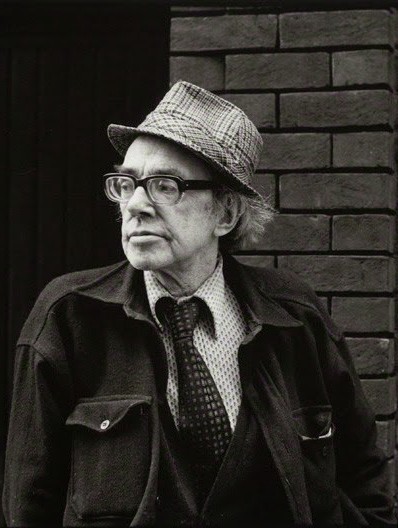
Beat the Devil (originally published under the pen name James Helvick)
2 notes
·
View notes
Photo
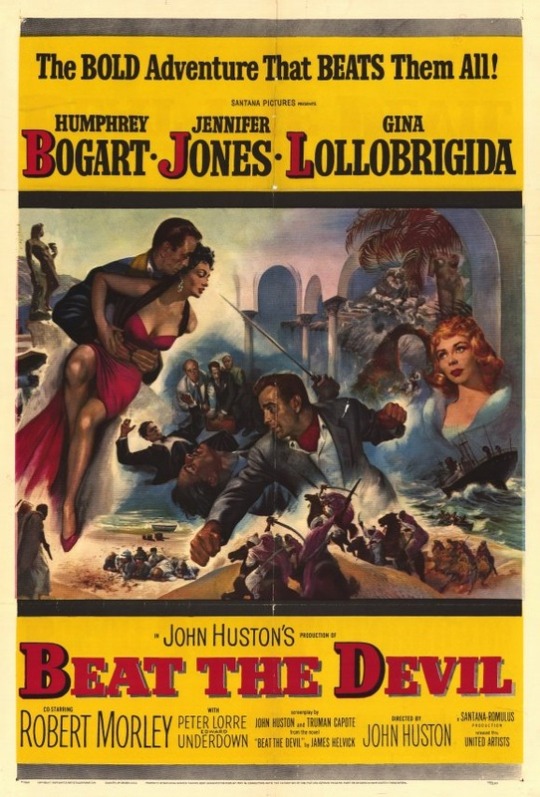
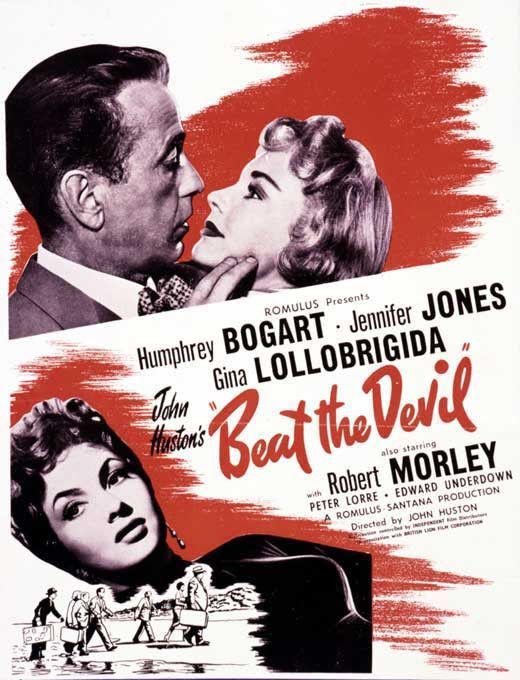
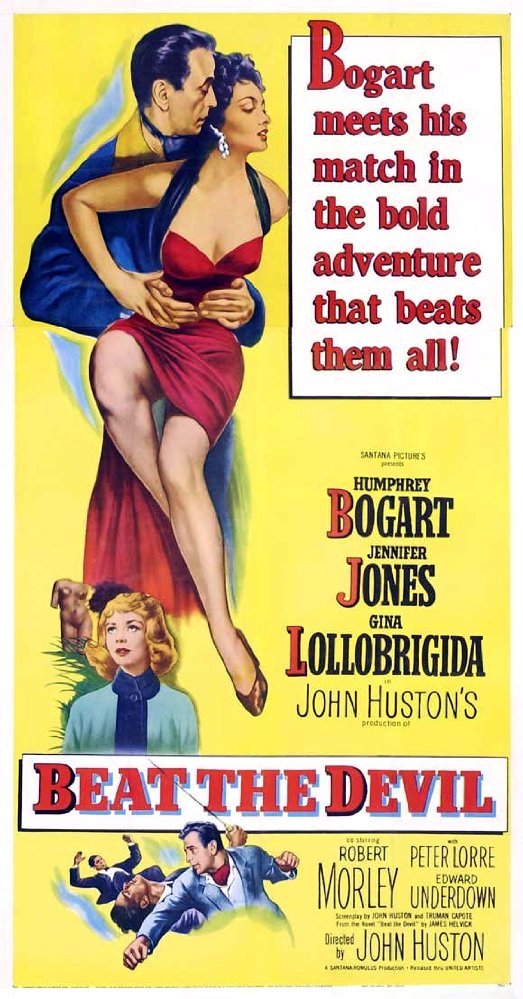
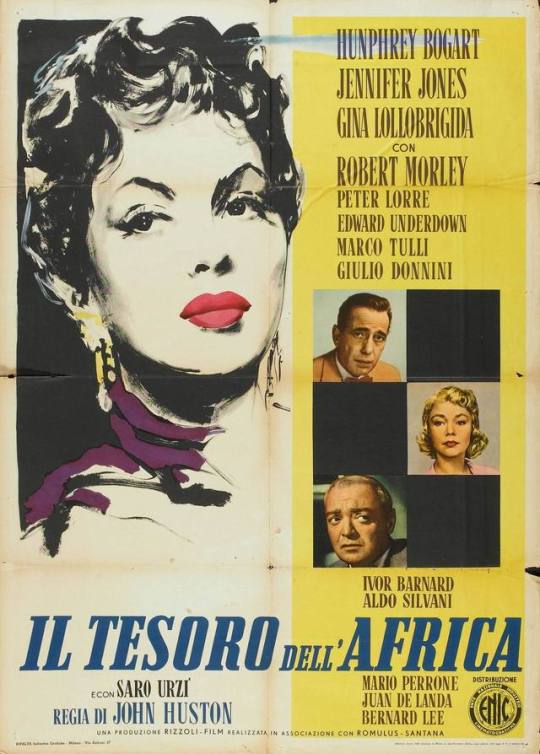
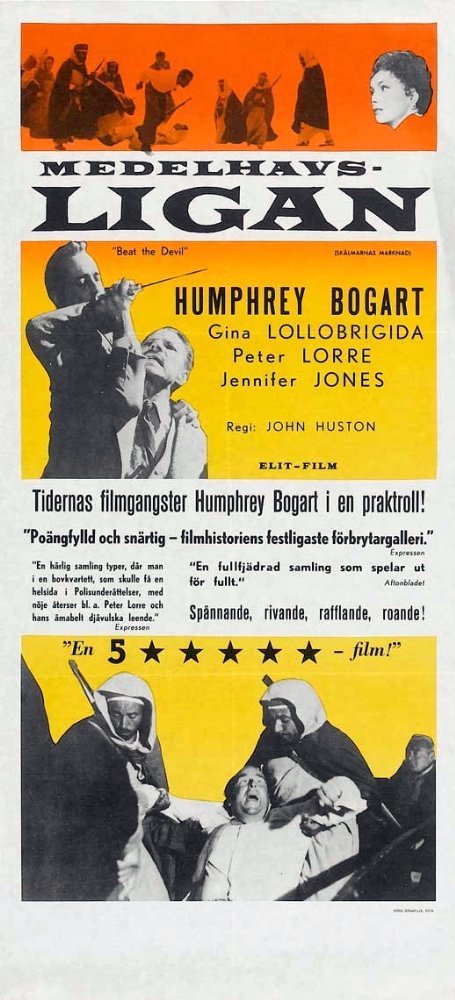
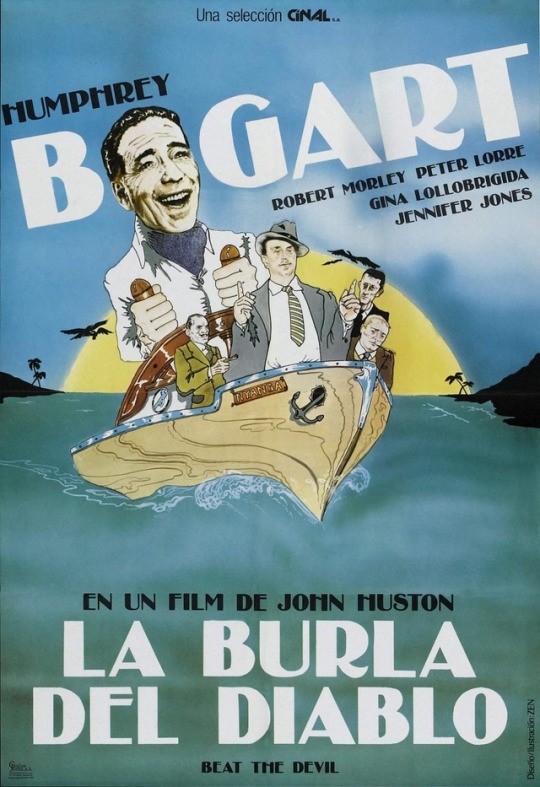
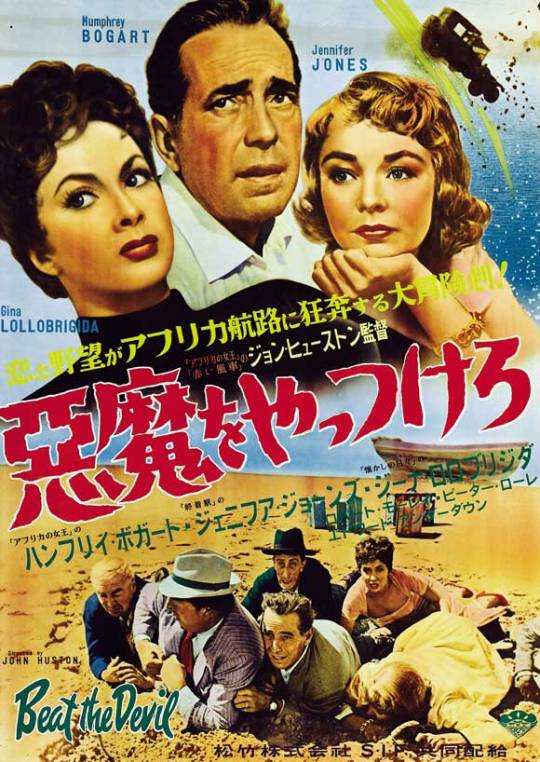
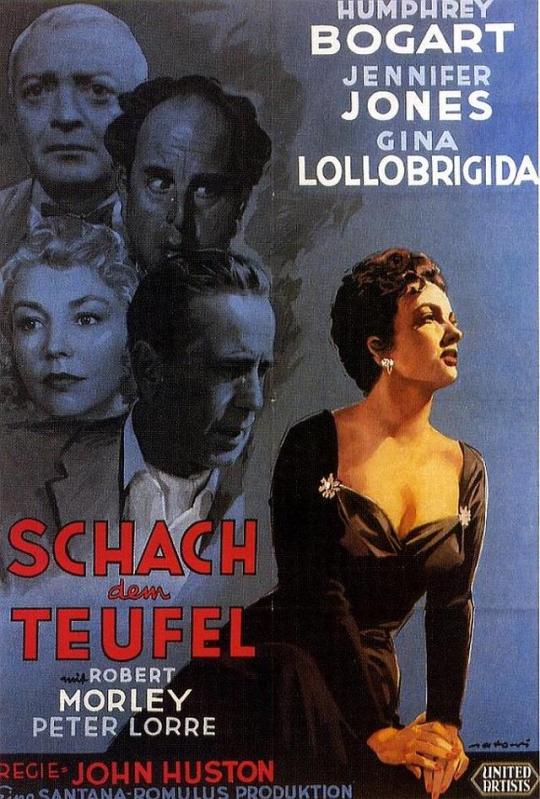
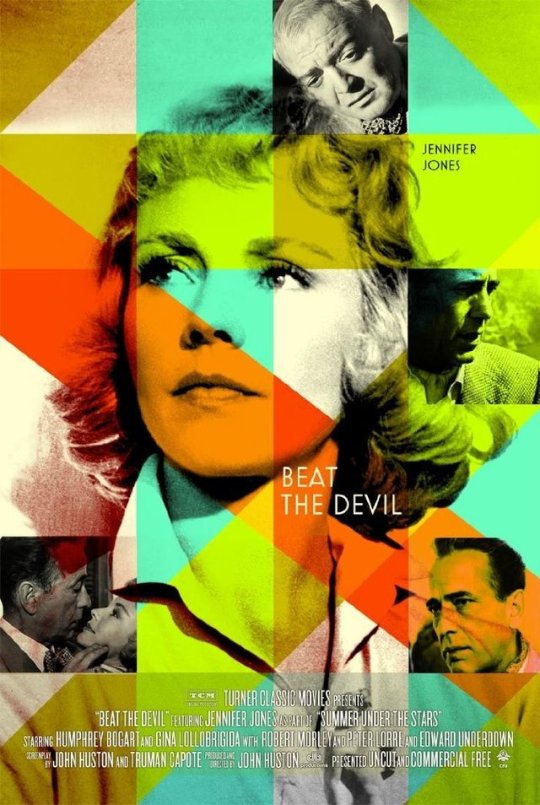
2017:84 — Beat the Devil
(1953 - John Huston) ***
#film#1953#Beat the Devil#John Huston#Claud Cockburn#James Helvick#Truman Capote#Humphrey Bogart#Jennifer Jones#Gina Lollobrigida#Robert Morley#Peter Lorre#Edward Underdown#Ivor Barnard#Marco Tulli#Bernard Lee#three stars
2 notes
·
View notes
Text
WE HAVE SCENARIO AND IN-HOUSE SHOWS! REPEAT, WE HAVE SCENARIO AND IN-HOUSE SHOWS!
We also have the casting of Queen Elizabeth, but we've had that for a little while now and I just never got around to shouting about it on here. It's the incomparable Jules Schrader – Diane de Poitiers c.2014, Eliza Barker c.2016, Jenny Groves c.2017, Queen Claude of Brittany c.2018, Mags Cockburn (independent) c.2019 & 2020. To the best of my knowledge, this is the first time we've had any given actor portray two entirely separate monarchs on separate occasions, and I'm hyped.
What follows is copied directly from the Faire's website, as always (aside from a couple proofreading corrections), with personal commentary in brackets below. I even left the shows in the same order as they appear on the website, no matter how much I wanted to sort them by track.
Scenario:
1585—England has finally established a colony in the New World! Sir Walter Raleigh, one of Elizabeth's favorite privateers and newly appointed Governor of Virginia has made Mount Hope a key trade port, and the shire has never been so prosperous! Of course, where there's money to be made, there will be people who want that money. The Earl whose lands Mount Hope sits upon has suddenly taken interest in the shire which he once left alone. Now he's come to collect his share of the bounty and perhaps set up a more permanent residence with little care if he displaces some peasants along the way. Will Her Majesty intervene? Will the shire ever be the same? People will become heroes, heroes will be made legends, and legends will be proven real.
In-house Bacchanalian (professional cast) shows:
Queen's Court
'Tis always a glorious day when Her Majesty Queen Elizabeth herself graces the shire of Mount Hope! Join the citizens of the shire and share in their excitement as they greet the Queen, Her retinue, and any surprise guests that may show up with intentions of their own!
[Quite literally the most generic summary possible for this show, applicable to every year containing Queen Elizabeth {except 2020}. Mercifully spoiler-free, but also provides no real info. 'Tis an understandable trade-off.]
Midday Revels
With such high expectations to entertain the Queen and her royal retinue, only Mount Hope could meet this challenge with this much spectacle and mirth! Watch as the Masters of Revels and the good people of the shire deftly entertain with music, dance, and jests that could only be matched by Dionysus themselves.
[Also fairly generic, but provides two very important pieces of information. One, there are MULTIPLE Masters of Revels this year, a fact which opens all sorts of possibilities. Two, in this particular version of reality, Dionysus uses they/them pronouns; and by golly, I am hecking here for that.]
Tournament of Arms
When the value of the shire is questioned, the Masters of Revels decide to skip the games of strategy and get right to the violence! A Tournament of Arms in which the citizens of Mount Hope display their bravery, cunning, and skill. Some more skilled than others. And a little side betting amongst the nobility never hurt anyone.
[This phrasing “skip the games of strategy and get right to the violence” posits this show as a contrast to the traditional Human Chess. A glance through the rest of the shows reveals that there is, in fact, no Human Chess scheduled this season. It is therefore a reasonable conclusion that this show will take the place of Human Chess. Definitely a little mixed feelings about that. There is something so quintessentially and iconically Ren Faire about Human Chess, and it will be strange – not necessarily good strange, though also not guaranteed bad strange – to witness a season otherwise normal without one. On the other hand, in the immortal words of Rowan and the Rose, “no one cares 'bout the chess part: just get to the fight!” And according to highly pedantic sources that are surprisingly not me, a good number of the moves employed in Human Chess don't actually follow the rules of chess; and that's without factoring in all the substitution and revival stuff, or the minigames like Saved by the Bell and Hot Lava. But back on that first hand, we have my biggest problem with it, which is that the removal of the strategy element also removes a good deal of character potential, as well as effectively rendering any leads not fighting irrelevant to the show. I suppose the matches could be selected by a lead (prolly the monarch/s), and fighters could still be on different sides like in Chess, and whichever's side wins any given fight gets points or something; but this still leaves the competing leads in a passive position. The most influence they could have would be in choosing who will fight on their team; the rest is a tossup. A game requiring strategy allows for those playing the game to actively influence the outcome, with the actual-fighting aspect enabling some measure of chance to remain. What sort of resentment could be indulged {2016} by saying “Let's pick people to fight each other and whoever picks the most winners wins”? What sort of friendly competition could be found {2018} in selecting other people to fight each other in random configurations? Why not simply say “I don't want to take sides in this matter {2019}, so you two-to-eight should find people who like you and literally battle each other's team over this matter”? And I can see absolutely no room for delicious subtle powerplays and diplomatic maneuvering {2017} in just setting up a PvP arena. As with most changes to the Faire (for changes are inevitable and, no matter how much certain sections of the fandom may gripe, necessary and not automatically bad), I will reserve full judgment on this matter until I witness how it works and what it brings to the dynamic of the day, characters, and plot. But my personal opinion on it is that it reduces the storytelling potential.]
Ultimate Joust
Join Her Majesty and the people of Mount Hope as they preside over the final joust of the day! Strength will be tested, Honor will be challenged, and the very cause of Chivalry hangs in the balance. An explosive fireworks celebration awaits the victorious Knight and their supporters should they prove worthy!
[It's Ultimate Joust. There's nothing new to say about Ultimate Joust, except perhaps raise eyebrows at “explosive fireworks celebration”, and mock-wonder whether those are actual fireworks or rather explosions designed to do harm. Granted, they were truly innocent fireworks in 2020, but that season played out rather differently overall.]
Finale Pub Sing
End the festival day in joyously boisterous song lead by the Musicians of the Shire! Join Her Majesty, Her Court, and the shire folk of Mount Hope as they bid you farewell with songs we all know and love.
[Is.... Is this not going to be hosted by characters? I understand for 2020, but continuing?]
Boar's Head Brawl
The Boar's Head Tavern always plays host to a unique and varied clientele on a festival day, and this day's festival is no exception. Nobles and commoners alike gather over a drink to bemoan their troubles, celebrate their victories, and set their eyes upon what they hope the morrow will bring. Unfortunately, some of the pub's patrons find their goals at odds! Unlikely alliances are forged, and the fate of the Boar's Head itself is at stake in this no-holds-barred pub-fight free-for-all!
[The only thing to pull from this is a.) it's still here, yay; it's a good combat show and provides critical insight into the motives and personality of the participants, for which reason I consider it {and the Melee} a plot show, as the characters involved are, by nature of the rest of the plot shows, generally plot-important, and really I will actually make a proper post about that someday because I have OPINIONS; and b.) the fate of the inn / tavern itself hangs in the balance this season. Granted, I suppose that technically any fight taking place in a building could be considered to hold the fate of the building, as there is a risk of the building getting wrecked.]
[Also this is not relevant, but a thing I learned recently is that the Boar's Head Inn and MacGuffin’s Tavern are both extremely unusual in that they serve as both temporary lodgings (inn) AND public houses / restaurants (tavern). Generally speaking, inns would provide food and drink for the people staying there, but only to those saying there. Taverns, on the other hand, did not have sleeping accommodations, and functioned as restaurants and bars. Somewhere along the line, we have conflated these two concepts – inns and taverns/alehouses – and turned them into interchangeable places that put travelers up for the night and also serve food and drink to people not staying there. I'm not actually fussed about that in the cases of the Boar's Head Inn and MacGuffin’s Tavern, because Mount Hope is weird and it's not out of character for the place to have such abnormal institutions. But it's definitely a fun and useful fact to know for other settings.]
English Wrestling
Welcome to English Wrestling World: E.W.W.! (We don't have that backwards, right?) Today Mount Hope's reigning champion, The Hooded Revenger, will face off against Tiger Baroness of Bexhill! Townsfolk gather to cheer on their gladiators, and nobles gather to wager on the outcome. With Revenger's title and the honor of the town on the line, foul play may be a foot…or an elbow.
[This is the funniest gotdamn concept for a show I have ever seen. Shoutout to Pat Gill of Polygon for enabling me to understand a word of it. Judging by the other shows and lack thereof, I'd say this is filling the second combat slot (non-plot), which used to be filled by Bloody Best, and then the Redemption of Captain Thatch.]
Disasterpiece Theater
The shire of Mount Hope is home to many a local Treader-upon-the-Stage, and they'd honestly be good if they had a better budget… and training… and discipline… being literate might help… but boy do they have heart!
Theatre will happen—It may be a Masterpiece, it may be a disaster, but it will always be a Disasterpiece.
[If I didn't already suspect it due to a different actor portraying the monarch {PLEASE pester me to talk about how I interpret universes, I've been meaning to since late 2017}, the lack of mention of Sir Walter in this description makes me about 80% sure that the continuity has rebooted, and this year is a different universe / version of reality from the Megan-Zach-Mary 'verse of 2016-2019+2020. I just hope that we occasionally get such long continuity again in the future. Anyway, Disasterpiece is still here, and I am exceedingly pleased. A show through which to divine the characters of the improv track is important.]
Trial and Dunke
At Trial and Dunke you're guaranteed two things: A trial in which a member of the shire is accused of something, and the dunking of guilty parties into the water below them. Join and help the authority of the shire decide whether someone's shenanigans have earned them a few dips in the pool of justice!
[Back again, yay; it's a fun show, with surprising potential to reveal character stuff.]
Whose Jest Is It Anyway?
Just because the Queen is on the shire doesn't mean the people of Mount Hope need to take themselves seriously all day! Come join the shire folk as they engage in some games of Wit, Hilarity, and Downright Silliness; all based on suggestions from the audience, so every show is different! Here are some testimonials from real audience members:
• "I laughed until I stopped!" - Bern D'bread, Baker
• "Seriously, whose jest is it? They never answer that blasted question!" - Yuri Gnollcakes, Privy Attendant
[WHOSE JEST IS BACK AGAIN STILL, BAYBEE! As I've mentioned before, my issue was never with the absence of this show, but rather the lack of a show through which to divine aught of the characters of the improv track; but that was fixed with the addition of Disasterpiece back in 2018. But it's always fun to filter short-form improv through characters and dialect. Or at least it's fun to watch. As far as what we can divine from this description, it is exactly the same as the 2020 description, but missing the testimonials of Leonardo Da Vinci and Bridget Moorehouse. The missing Leo testimonial is whatever. The missing Bridget testimonial, however, solidifies for me the impression that this season is a reboot, that we are beginning a new continuity. It had to happen sometime. Four-or-five years of coherent continuity is astoundingly long, and we have been quite fortunate to have it. My hope, besides getting later continuities of similar lengths, is that the fandom doesn't forget the characters and events of the Megan-Zach-Mary 'verse, because it's sure gonna be awkward for all of us if nobody but me and the Germanos understands or cares about the headcanons and memes and {really, someday, I swear} fanfic I post about that universe {this is your regular unsolicited reminder that I have finished and posted one short PARF fic on ao3 and I know damn well most of you haven't read it 'cause it only has fifty hits and at least half of those are from me, what the heck, go read the bloody thing}.]
Taming of the Shrews
The Queens have arrived. Everyone's favorite Renaissance Drag Show is back for another season! Join The Lady Lilith Rose, Shakespeare's Reigning Premier Female Illusionist as she searches for the individual who possesses the Bravery, Resilience, Elegance, Ambition, Strength, and Talent to be crowned 'Shakesqueer's Next Drag Superstar!'' God Shave the Queens! (Trust us, some of them need it.)
[Very good, very good, this is returning, and I suspect it shall be even more polished than before. {If any patron/s use/s it as an excuse to be transphobic, the cast involved with the show are legally allowed to yeet said patron/s over the village walls.}]
Tea Time
They say the only certainty in this world is death and taxes; well we would wager there is one more…gossip. Tea is served dears, and it is piping hot. Join two of the most in-the-know nobles as they discuss and divulge the shire's secrets and spill the tea.
[Oh hell yeeeeaaahhhhhh.]
The Rakish Rogues
Zounds! William Shakespeare and three of his most prized actors have taken a hiatus from London's stages to share their many musical talents with Mount Hope. Their verse will be in song, their jests wickedly icky, and their character charming enough to turn any frown upside down.
[You're telling me that after finally, finally hitting upon the perfect unifying thing for the Rogues – highwaymen – after forty years {less in actuality, but I don't know how much less}, they're changing it again already?? They couldn't at least give us a few years with it first? Highwaymen makes SO MUCH sense for these archetypes, and gives them perfectly equal footing with the Sirens {so long as the Sirens are pyrates, which again is perfect}. I'm not saying that the Rogues as the Queen's Men will be bad, simply that I can conceive of no way in which highwaymen wouldn't be better. That being said, it will be interesting to see whether or not Shakespeare is portrayed by Rob Condas again. I’ve no idea of Rob’s musical ability or lack thereof, and a different actor would be in keeping with the continuity reboot.]
The Sirens
The crew of The Kraken's Kill are fearsome female pirates indeed, but they also make merry with jaunty shanties of the sea! Join Mary Killigrew and her crew as they sing magnificent harmonies, engage in some naughty nautical humor, and regale you with tales on the high seas.
[GOOD the Sirens are still a.) pyrates, and b.) simply the Sirens. It's a good way to guarantee a baseline of at least a few pyrate characters, and what patron doesn't like pyrates? {aside from the sort who are so uptight about anachronisms that they scold their teen offspring for playing on their phone while waiting for a show to start, but who I guarantee were wearing modern underwear under their also-not-period-correct costume, and I didn't hear them complaining about the sound-systems or flushing toilets, and I've gone on a personal rant, haven't I.} And like, when you come up with a unifying thing for a bawdy group of women called The Sirens that works as well and imparts as much autonomy as pyrates, then I'll concede that pyrates are not, in fact, the best unifying thing for this group, and that there is another unifying thing equally as good. The other things we can glean from this are a.) the Sirens are once more all from the same crew as in 2018 rather than united captains of separate ships as in 2019; and b.) the captain’s name is Mary Killigrew and her ship is called the Kraken's Kill. I wonder what the shouted response to that ship name will be, if that’s a thing again.]
The Rogues & Sirens Pub Show
When Mount Hope needs them most, when the people implore for more song and vulgarity, when drinking and revelry is only made better with jaunty tunes and double entendre, The Rogues and Sirens join forces to satiate the musical hunger and bawdy thirst of their patrons.
[These descriptions really are a masterclass in generics and vagueness. Not particularly a complaint – as I said at the start, it prevents anything even I would consider spoilers, and boy oh boy do I have an absurdly strict definition of spoilers – simply an observation. I wonder if there are plans to update them to be specific to this year once things are more locked in.]
Queen's Cavalry
Bring your nipperkins ages 5-11 to the Chess Board to become part of this most elite cavalry. They will learn how to impress our good Queen Elizabeth with the mightiest of bows and curtsies. And, of course, what cavalry would be worth its salt without mighty steeds! Ours happen to be "kid powered" but that makes them even mightier!
[As I have mentioned previous years: everybody who attends Queen’s Cavalry because they went to the Chessboard early to secure good seats, Y’ALL BETTER FUCKIN’ CLAP AND CHEER FOR THOSE KIDS, I SWEAR! Also, please note that the word “cavalry” has the 'V' before the 'L', and pronounce it correctly as such, else you will instead be referring either to a location of relevance for a certain religion, or to “an experience of usually intense mental suffering”, according to Merriam-Webster; and while I suppose the latter has the potential to also apply to Queen's Cavalry, I'm quite certain that is not the goal of the show.]
------------------------------
And that's it! My personal takeaways and opinions that were not already expressed in the brackets are as follows:
Ayo, where the fuck is the non-asterisk Bacchanalian music group?? Some people are children, and some people have children, and some people simply do not care for that sort of humor, or do not care for that sort of humor in such a high capacity as in a full-on asterisk show. And all such folk deserve the opportunity to enjoy the character-revealing professional-quality in-house music groups. It doesn’t have to be the Irish Revels. Would I like the Irish Revels? Yes. I would also like the Scallywags, or the Daughters of Ireland, or even Joyful Noyse. The issue is not the removal of the Revels, but the lack of an equal or greater replacement.
My only other takeaway / opinion / thought is surprise at the absence of Music With Her Majesty, particularly knowing the musical prowess and history of Jules Schrader . It’s not particularly disappointment – Music With Her Majesty comes and goes based on the actor portraying Her Majesty, and I am aware of this. It is simply surprise. (Though Music With Her Majesty could provide a non-asterisk in-house music show, so I suppose I am disappointed in a way; but it’s an extension of my disappointment in the lack of a non-asterisk group, not actually disappointment in the lack of Music With Her Majesty.)
I think that’s it. Maybe it’s not, I don’t know; I’m too tired to tell (but that is a matter between me and my 3am hyperfocus). I guess my other quasi-takeaway is to always analyze why you’re upset when something changes. Are you upset because the change lessens the quality of the result, or has significant potential to do so? If it looks like it may reduce the quality, can you articulate how the quality would be lessened? Because if not, you may simply be upset with the concept of change, or having trouble adapting to something different. Even with my personal gripes (which I would like to reiterate are the PERSONAL OPINIONS of one solitary fan of PARF who happens to have taken the initiative to sometimes make fandom content), I am perfectly aware that this season is still going to be spectacular, because that is what the actors and the rest of the creative team at PARF do. They’ll work within what’s new and what’s old to create an excellent and worthwhile experience, one that is a little different from past experiences, which is what literally every new season is.
#um i am far too tired and not nearly coherent enough for tags#i'll come back and tag this in the next few days when my brain works better#parf 2021#parf 2021 news#parf news
5 notes
·
View notes
Text

Never believe anything until it has been officially denied - Claud Cockburn.
25 notes
·
View notes
Text
Newsletters' glorious history
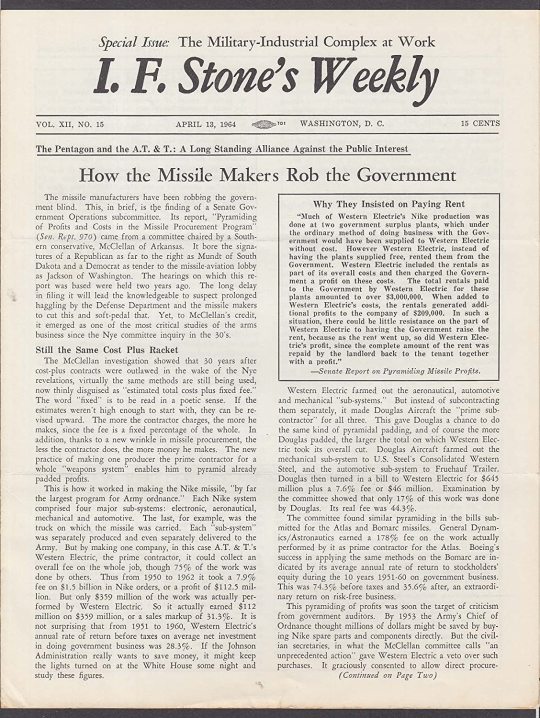
It sure feels like we're living through an unprecedented boom in newsletters, but while email-based newsletters are experiencing a major surge, newsletters themselves have a long and honorable history.
https://www.wired.com/story/peak-newsletter-that-was-80-years-ago/
In Wired, Michael Waters describes the newsletter boom of the 1930s, starting with Claud Cockburn's "The Week," launched in 1933 out of disgust with his employer, The Telegraph, and its right-wing complacency (Cockburn went on to break the story of Franco's fascist coup).
The rise of cheap mimeographs - coupled with the USPS's subsidy for printed materials - created a boom in all kinds of niche and political publications, from sf fanzines to Allen Ginsburg's self-published chapbooks to The Ladder, a 1950s lesbian newsletter.
Left-populism had a major home in newsletters, providing an alternative to the pro-big-business/pro-monopoly/anti-labor/anti-New Deal bias of the newspaper industry.
I hadn't known about In Fact, the newsletter founded by the ex-Chicago Tribune muckraker George Seldes.
Seldes billed In Fact as "An Antidote for Falsehood in the Daily Press," reached 176,000 subscribers, and featured exposes on strike-breakers, tobacco industry/newspaper conspiracies to cover up smoking-related health risks, and FBI anti-union spying.
In Fact inspired IF Stone to start his legendary Weekly, a 20-year newsletter that Stone published to 70,000 subscribers from a hand-cranked mimeograph machine.
But this golden age of leftist newsletter publishing was crippled by the Red Scare, and the risks of appearing on a list of subscribers to a radical publication.
The right's newsletters - paranoid, proto-Bircher publications like Joseph P Kamp's Headlines, and What's Behind Them ("Are Communists Infiltrating the YMCA?") morphed into the powerful newsletters published by Ayn Rand and Phyllis Schlafly, buoyed by the direct mail boom.
Today, the legacy of the direct mail boom is a clutch of wealthy, ruthless grifters making enormous bank by terrorizing elderly Fox viewers into making donations they can't afford.
https://pluralistic.net/2020/07/20/no-mask-no-service/#dorr-brothers
But lefty, anti-monopoly newsletter publishing is also alive and well, as tech startups like Substack promise both revenue streams AND access to the last truly federated distribution system: email.
I really enjoy many of these new newsletters, though I worry that, on the one hand, they include a lot of invasive tracking, and on the other, that consolidation in email providers makes them incredibly dependent on Big Tech's forbearance.
https://pluralistic.net/2020/06/08/the-last-federated-platform/#postal-inspectors
I have my own (totally independent, tracker-free, zero analytics, ad-free) newsletter, the Plura-List.
https://mail.flarn.com/mailman/listinfo/plura-list/
I've discovered that if a bunch of my subscribers on, say, Apple Mail, don't open their daily newsletters, Apple's analytics classes the publication as spam for ALL subscribers on its platform.
The consolidated nature of email is also very apparent in the software I use for the Plura-list, the venerable Mailman tool, a creaking dinosaur that looks terrible and is difficult for both publishers and subscribers to use.
And yet, it's the best option if you want to host your own mailing lists (rather than exposing your subscribers to potential data-mining, etc).
Meanwhile, if this history of mailing lists has you intrigued, I strongly urge you to check out the anthologies of IF Stone's Weekly.
http://ifstone.org/collected_writings.php
I discovered these in the early 90s when I was working at Toronto's College Books, where the owner, Michael Jackel, had ordered them for our politics section. These anthologies absolutely blew my mind and transformed the way I thought about personal political writing.
Decades later, they still resonate.
17 notes
·
View notes
Photo

Wall Street, October 1929 FIRST HOPE FINANCIAL http://firsthope.biz Claud Cockburn, writing for the "Times of London" from New-York, described the irrational exuberance that gripped the nation just prior to the Great Depression. As Europe wallowed in post-war malaise, America seemed to have discovered a new economy, the secret of uninterrupted growth and prosperity, the fount of transforming technology: "The atmosphere of the great boom was savagely exciting, but there were times when a person with my European background felt alarmingly lonely. He would have liked to believe, as these people believed, in the eternal upswing of the big bull market or else to meet just one person with whom he might discuss some general doubts without being regarded as an imbecile or a person of deliberately evil intent - some kind of anarchist, perhaps." The greatest analysts with the most impeccable credentials and track records failed to predict the forthcoming crash and the unprecedented economic depression that followed it. Irving Fisher, a preeminent economist, who, according to his biographer-son, Irving Norton Fisher, lost the equivalent of $140 million in today's money in the crash, made a series of soothing predictions. On October 22 he uttered these avuncular statements: "Quotations have not caught up with real values as yet ... (There is) no cause for a slump ... The market has not been inflated but merely readjusted..." Even as the market convulsed on Black Thursday, October 24, 1929 and on Black Tuesday, October 29 - the New York Times wrote: "Rally at close cheers brokers, bankers optimistic". In an editorial on October 26, it blasted rabid speculators and compliant analysts: "We shall hear considerably less in the future of those newly invented conceptions of finance which revised the principles of political economy with a view solely to fitting the stock market's vagaries.'' But it ended thus: "(The Federal Reserve has) insured the soundness of the business situation when the speculative markets went on the rocks.'' Compare this to Alan Greenspan Congressional testimony this summer: "While bubbles that burst are scarcely benign, the consequences need not be catastrophic for the economy ... (The Depression was brought on by) ensuing failures of policy." Investors, their equity leveraged with bank and broker loans, crowded into stocks of exciting "new technologies", such as the radio and mass electrification. The bull market - especially in issues of public utilities - was fueled by "mergers, new groupings, combinations and good earnings" and by corporate purchasing for "employee stock funds". Cautionary voices - such as Paul Warburg, the influential banker, Roger Babson, the "Prophet of Loss" and Alexander Noyes, the eternal Cassandra from the New York Times - were derided. The number of brokerage accounts doubled between March 1927 and March 1929. When the market corrected by 8 percent between March 18-27 - following a Fed induced credit crunch and a series of mysterious closed-door sessions of the Fed's board - bankers rushed in. The New York Times reported: "Responsible bankers agree that stocks should now be supported, having reached a level that makes them attractive.'' By August, the market was up 35 percent on its March lows. But it reached a peak on September 3 and it was downhill since then. On October 19, five days before "Black Thursday", Business Week published this sanguine prognosis: "Now, of course, the crucial weaknesses of such periods - price inflation, heavy inventories, over-extension of commercial credit - are totally absent. The security market seems to be suffering only an attack of stock indigestion... There is additional reassurance in the fact that, should business show any further signs of fatigue, the banking system is in a good position now to administer any needed credit tonic from its excellent Reserve supply." The crash unfolded gradually. Black Thursday actually ended with an inspiring rally. Friday and Saturday - trading ceased only on Sundays - witnessed an upswing followed by mild profit taking. The market dropped 12.8 percent on Monday, with Winston Churchill watching from the visitors' gallery - incurring a loss of $10-14 billion. The Wall Street Journal warned naive investors: "Many are looking for technical corrective reactions from time to time, but do not expect these to disturb the upward trend for any prolonged period." The market plummeted another 11.7 percent the next day - though trading ended with an impressive rally from the lows. October 31 was a good day with a "vigorous, buoyant rally from bell to bell". Even Rockefeller joined the myriad buyers. Shares soared. It seemed that the worst was over. The New York Times was optimistic: "It is thought that stocks will become stabilized at their actual worth levels, some higher and some lower than the present ones, and that the selling prices will be guided in the immediate future by the worth of each particular security, based on its dividend record, earnings ability and prospects. Little is heard in Wall Street these days about 'putting stocks up." But it was not long before irate customers began blaming their stupendous losses on advice they received from their brokers. Alec Wilder, a songwriter in New York in 1929, interviewed by Stud Terkel in "Hard Times" four decades later, described this typical exchange with his money manager: "I knew something was terribly wrong because I heard bellboys, everybody, talking about the stock market. About six weeks before the Wall Street Crash, I persuaded my mother in Rochester to let me talk to our family adviser. I wanted to sell stock which had been left me by my father. He got very sentimental: 'Oh your father wouldn't have liked you to do that.' He was so persuasive, I said O.K. I could have sold it for $160,000. Four years later, I sold it for $4,000." Exhausted and numb from days of hectic trading and back office operations, the brokerage houses pressured the stock exchange to declare a two day trading holiday. Exchanges around North America followed suit. At first, the Fed refused to reduce the discount rate. "(There) was no change in financial conditions which the board thought called for its action." - though it did inject liquidity into the money market by purchasing government bonds. Then, it partially succumbed and reduced the New York discount rate, which, curiously, was 1 percent above the other Fed districts - by 1 percent. This was too little and too late. The market never recovered after November 1. Despite further reductions in the discount rate to 4 percent, it shed a whopping 89 percent in nominal terms when it hit bottom three years later. Everyone was duped. The rich were impoverished overnight. Small time margin traders - the forerunners of today's day traders - lost their shirts and much else besides. The New York Times: "Yesterday's market crash was one which largely affected rich men, institutions, investment trusts and others who participate in the market on a broad and intelligent scale. It was not the margin traders who were caught in the rush to sell, but the rich men of the country who are able to swing blocks of 5,000, 10,000, up to 100,000 shares of high-priced stocks. They went overboard with no more consideration than the little trader who was swept out on the first day of the market's upheaval, whose prices, even at their lowest of last Thursday, now look high by comparison ... To most of those who have been in the market it is all the more awe-inspiring because their financial history is limited to bull markets." Overseas - mainly European - selling was an important factor. Some conspiracy theorists, such as Webster Tarpley in his "British Financial Warfare", supported by contemporary reporting by the likes of "The Economist", went as far as writing: "When this Wall Street Bubble had reached gargantuan proportions in the autumn of 1929, (Lord) Montagu Norman (governor of the Bank of England 1920-1944) sharply (upped) the British bank rate, repatriating British hot money, and pulling the rug out from under the Wall Street speculators, thus deliberately and consciously imploding the US markets. This caused a violent depression in the United States and some other countries, with the collapse of financial markets and the contraction of production and employment. In 1929, Norman engineered a collapse by puncturing the bubble." The crash was, in large part, a reaction to a sharp reversal, starting in 1928, of the reflationary, "cheap money", policies of the Fed intended, as Adolph Miller of the Fed's Board of Governors told a Senate committee, "to bring down money rates, the call rate among them, because of the international importance the call rate had come to acquire. The purpose was to start an outflow of gold - to reverse the previous inflow of gold into this country (back to Britain)." But the Fed had already lost control of the speculative rush. The crash of 1929 was not without its Enrons and World.com's. Clarence Hatry and his associates admitted to forging the accounts of their investment group to show a fake net worth of $24 million British pounds - rather than the true picture of 19 billion in liabilities. This led to forced liquidation of Wall Street positions by harried British financiers. The collapse of Middle West Utilities, run by the energy tycoon, Samuel Insull, exposed a web of offshore holding companies whose only purpose was to hide losses and disguise leverage. The former president of NYSE, Richard Whitney was arrested for larceny. Analysts and commentators thought of the stock exchange as decoupled from the real economy. Only one tenth of the population was invested - compared to 40 percent today. "The World" wrote, with more than a bit of Schadenfreude: "The country has not suffered a catastrophe ... The American people ... has been gambling largely with the surplus of its astonishing prosper
1 note
·
View note
Photo
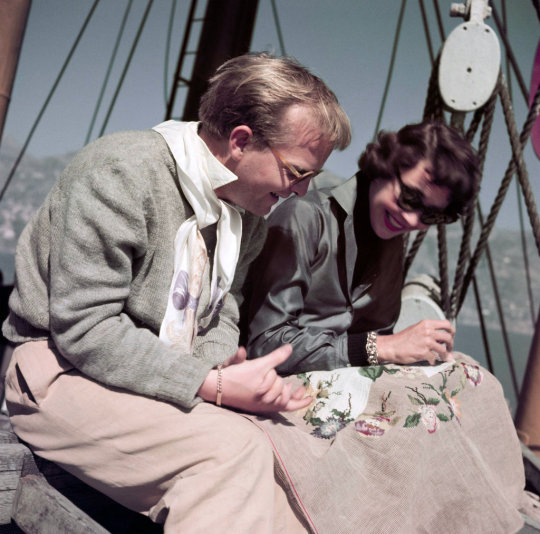
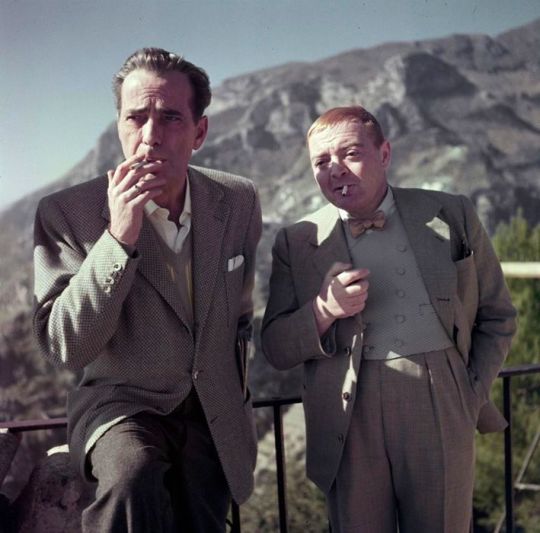
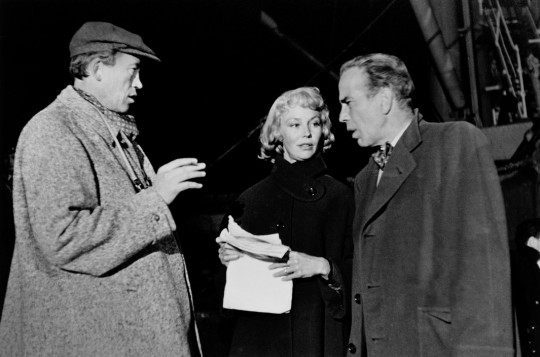
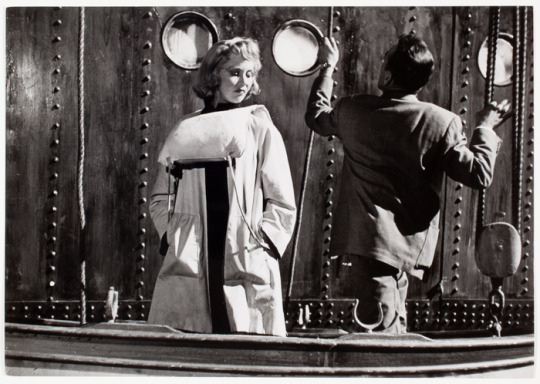
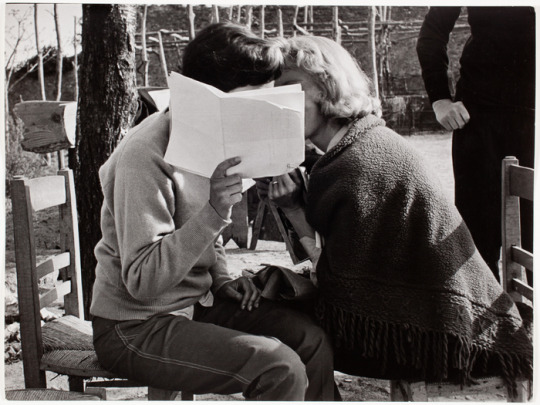
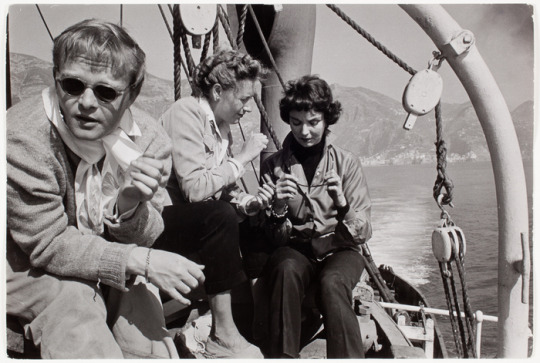
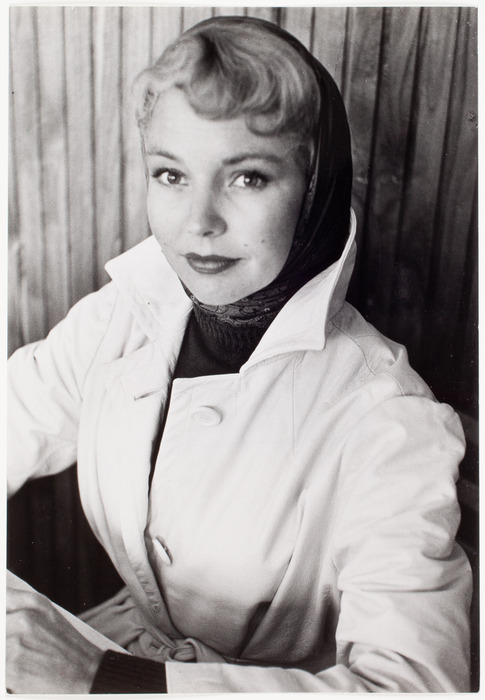
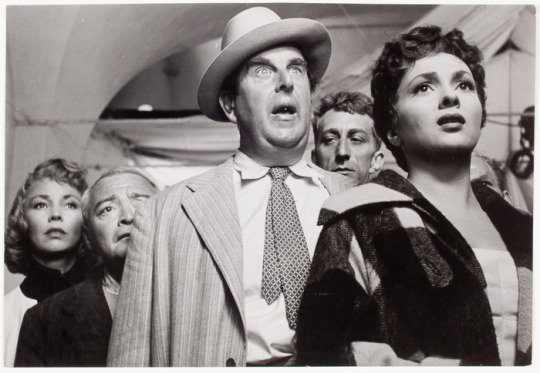
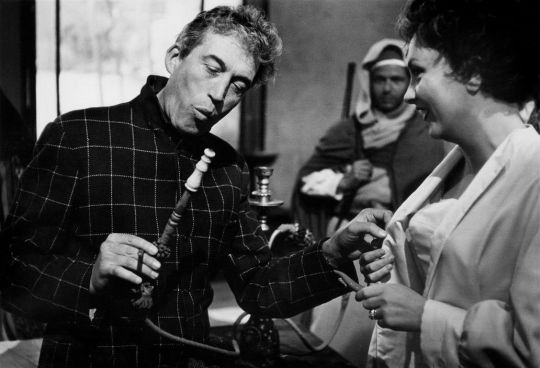
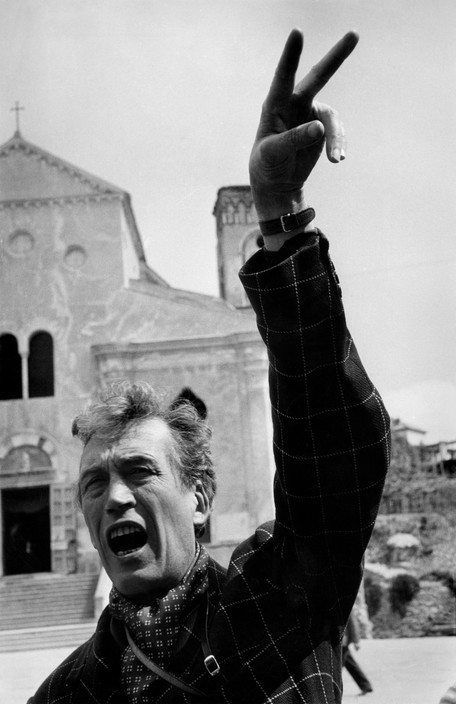
Ravello, Italy April, 1953. Truman Capote, Jennifer Jones, Humphrey Bogart, Peter Lorre, Robert Morely and Gina Lollobrigida and director John Huston on the set of ‘Beat the Devil’, photographed by Robert Capa.
After reading Claud Cockburn’s novel, Huston persuaded Bogart to buy the film rights through Bogart's Santana Pictures and invest $400k to cover the salaries of Bogart, Jones and Huston plus the cost of the screenplay. Truman Capote was brought in to work with Huston on completing the script, late in the process, on the recommendation of David O Selznik (husband of Jennifer Jones).
Capote wrote the script on the set, working two to three days ahead of the shooting schedule. Bogart said of Capote “"He wrote like fury. He had the damnedest and most upside-down slant on humour you've ever heard." Bogart challenged Capote to an arm wrestling bout for a $50 wager and lost three times before the evening degenerated to full wrestling!
During production Bogart was involved in a serious automobile accident which knocked out several of his teeth, hindering his ability to speak. In post production Huston allegedly hired a young Peter Sellers, noted for his mimicry skills, to rerecord some of Bogart's spoken lines.
3 notes
·
View notes
Video
youtube
Beat The Devil (1953) [Action] [Adventure] [Comedy]
Timeless Classic Movies
Beat the Devil is a 1953 British film directed by John Huston, starring Humphrey Bogart, Jennifer Jones and Gina Lollobrigida, and featuring Robert Morley, Peter Lorre and Bernard Lee.
Huston and Truman Capote wrote the screenplay, loosely based upon a novel of the same name by British journalist Claud Cockburn, writing under the pseudonym James Helvick.
Houston made the film as a parody of a genre of film. Although often described as a parody of The Maltese Falcon, which Huston directed and in which Bogart and Lorre appeared, this is not the case.
The script, written on a day-to-day basis as the film was shot, concerns the adventures of a motley crew of swindlers and ne'er-do-wells trying to claim land rich in uranium deposits in Kenya as they wait in a small Italian port to travel aboard a tramp steamer en route to Mombasa.
---
Plot: Billy Dannreuther (Humphrey Bogart) is a formerly-wealthy American who has fallen on hard times. He is reluctantly working with four crooks: Peterson (Robert Morley), ex-Nazi Julius O'Hara (Peter Lorre), Major Jack Ross (Ivor Barnard) and Ravello, who are trying to acquire uranium-rich land in British East Africa. Billy suspects that Major Ross murdered a British Colonial officer, who threatened to expose their plan. While waiting in Italy for passage to Africa, Billy and his wife Maria (Gina Lollobrigida) meet a British couple: Harry (Edward Underdown) and Gwendolen Chelm (Jennifer Jones), who plan to travel on the same ship. Harry is a very proper and traditional Englishman, while Gwendolen is flighty and fanciful and a compulsive liar. Billy and Gwendolen have an affair, while Maria flirts with Harry. Peterson becomes suspicious that the Chelms may be attempting to acquire the uranium themselves. His suspicions are unfounded, but they seem to him to be confirmed by Gwendolen, who lies about her husband and exaggerates his importance.
Billy and Peterson are in a car accident and wrongly reported to have been killed. In order to replace Peterson's lost capital, Ravello approaches Harry Chelm and explains their scheme. Just then, to everyone's surprise, Billy and Peterson return to the hotel alive and unharmed. The purser announces that the ship is at last ready to sail. On board, Harry reveals that he knows about Peterson's scheme and intends to inform the authorities. Peterson orders Major Ross to kill Harry, but Billy thwarts the murder attempt. Harry's outraged accusations alienate the ship's drunken captain, who locks Harry in the brig, where he is uncomfortable, but safe from Major Ross.
The ship's engine malfunctions and the ship sinks. When Billy goes to free Harry he finds that Harry has escaped and left the ship, intending to swim ashore. The passengers abandon the sinking ship in a lifeboat and land on an African beach, where they are arrested by Arab soldiers. They are interrogated by Ahmed, an Arab official who suspects that they may be spies or revolutionaries. Billy befriends Ahmed by talking with him about Rita Hayworth, upon whom Ahmed has a crush. Billy persuades him to send the party back to Italy. When they land, they are met and questioned by a Scotland Yard detective (Bernard Lee), who is investigating the murder of the Colonial officer. Gwendolen reveals Peterson's scheme, and his involvement in the murder, and his attempt to murder Harry, to the detective, who promptly arrests Peterson, O'Hara, Major Ross and Ravello. As the four crooks are led away in handcuffs, Gwendolen receives a telegram from British East Africa saying that Harry has acquired the land Peterson and the others meant to steal, and is now extremely rich and willing to forgive Gwendolen, Billy and Maria. Billy laughs happily, saying "This is the end, the end!".
---
Directed and produced by John Huston, screenplay by John Huston and Truman Capote, based on the novel Beat the Devil (1951) by Claud Cockburn (as James Helvick), starring Humphrey Bogart as Billy Dannreuther, Jennifer Jones as Mrs. Gwendolen Chelm, Gina Lollobrigida as Maria Dannreuther, Robert Morley as Peterson, Peter Lorre as Julius O'Hara, Edward Underdown as Harry Chelm, Ivor Barnard as Maj. Jack Ross, Marco Tulli as Ravello, Bernard Lee as Insp. Jack Clayton, Mario Perrone as Purser on SS Nyanga, Giulio Donnini as Administrator, Saro Urzì as Captain of SS Nyanga, Aldo Silvani as Charles, restaurant owner and Juan de Landa as Hispano-Suiza Driver --- Source: "Beat the Devil (film)" Wikipedia, The Free Encyclopedia. Wikimedia Foundation, Inc.. 27 November 2016. Web. 29December 2016.
https://en.wikipedia.org/wiki/Beat_th...) If you like this movie and our channel, please subscribe: https://goo.gl/0qDmXeCategoryFilm and AnimationSHOW LESS
5 notes
·
View notes
Video
youtube
“Gentlemen, in the little moment that remains to us between the crisis and the catastrophe, we may as well drink a glass of champagne.” - Paul Claudel [Claud Cockburn, ‘In Time of Trouble’ (1956)]
0 notes
Text
Actrice américaine

Elle est née à New York, New York, États-Unis. Son vrai nom est Olivia Jane Cockburn.
Les parents d'Olivia sont Lesley Cockburn, productrice de l'émission télévisée "60 Minutes" et le journaliste Andrew Cockburn. Olivia est la petite-fille du célèbre romancier et journaliste irlandais Claude Cockburn et la nièce de l'auteur de romans policiers populaires Sarah Caudwell.
Il a étudié dans des lycées de Washington et du Massachusetts. Après le déménagement de sa famille à Dublin, Olivia fréquente la Gaiety School of Acting.
Elle a commencé sa carrière cinématographique en tant qu'assistante directrice de casting, puis a fait ses débuts au cinéma avec un rôle dans la série télévisée "Skin" (2003-2004). Le premier rôle dans un grand film dans l'image - "Neighbor" (2004).
La première popularité d'Olivia Wilde a été apportée par le rôle d'Alex Kelly dans la série télévisée "Lonely Hearts" (2004-2005). Après cela, il y a eu des rôles dans les films "Vicious Liaisons" (2005), "Alpha Dog" (2006), "Touristas" (2006) et "Pretext" (2007).
En 2007, Olivia a joué l'un des rôles principaux dans la série télévisée NBC "The Donnelly Brothers", puis a rejoint le casting principal de la série télévisée "Doctor House" (2007-2011).
#cinéma#unfilmcouleur#film#comportementhumaines#actionshumaines#joie#plaisir#aventures#lesdessinsanimés#buxberg
0 notes
Text
It Happened in Chile
It Happened in Chile
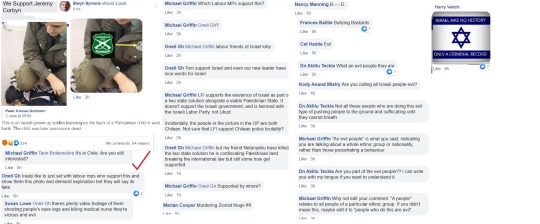
From Wikipedia
Claud Cockburn became a journalist with The Times and worked as a foreign correspondent in Germany and the United States before resigning in 1933 to start his own newsletter, The Week. It has been claimed that during his spell as a sub-editor on The Times, Cockburn and colleagues competed (with a small prize for the winner) to write the dullest printed headline. Cockburn only…
View On WordPress
0 notes
Quote
The press has been described by veteran newsman Harrison Salisbury as "holding up a looking glass to history." The press does far more than passively hold up that looking glass; it positions the glass, and the way it does that serves to shape the events themselves.
[...]
As the British journalist Claud Cockburn observed, "All stories are written backwards—they are supposed to begin with facts and develop from there, but in reality they begin with a journalist's point of view, a conception, and it is the point of view from which the facts are subsequently organized. Journalistically speaking, "in the beginning is the word."
And it is on the basis of that word that much of history is written. The press record is a large part of the raw material from which historians try to shape a coherent whole.
Deborah Lipstadt, Beyond Belief: The American Press and the Coming of the Holocaust
1 note
·
View note
Text
Never believe anything until it has been officially denied. - Claud Cockburn
5 notes
·
View notes
Text
Photo Blog: Day 2013
Photo Blog: Day 2013
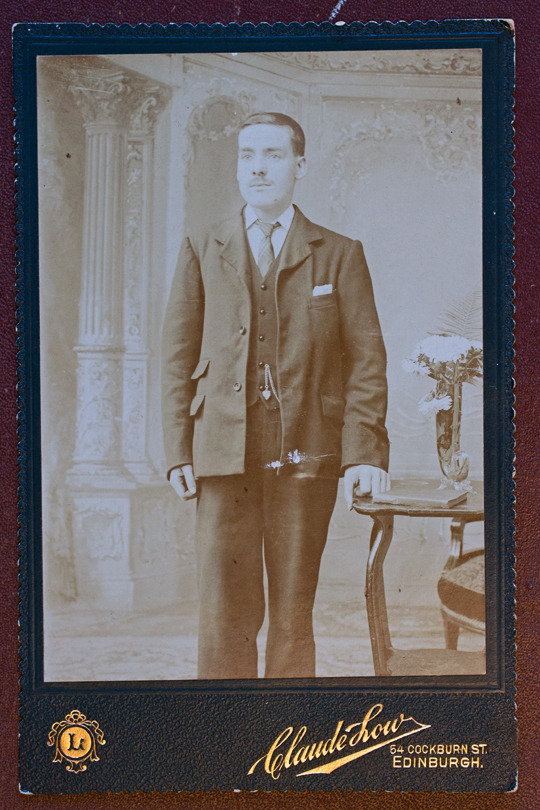
#2013 – Claude Low Worthing, 13th July 2017. A slight uncertainty in this young man’s posture, just adds to the charm. Photographic Artist Claude Low worked out of his Edinburgh studio between 1896 and 1910. Again, I have been able to find out little else about the man, but his second studio in Aberdour will have brought in the seaside trade. The Cockburn Street studio was a busy thoroughfare;…
View On WordPress
#2017#art#daily#Edinburgh#history#light#look#man#moment#monochrome#moustache#people#photo#photographer#photography#project#Richard Cooper-Knight#Scotland#work
0 notes